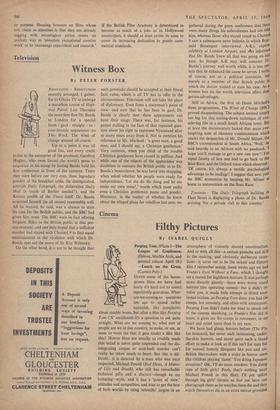Television
Witness Box
By PETER FORSTER
ASSOCIATED - REDIFFUSION recently arranged, I gather, for its Ghana TV to undergo a marathon course of High- way Patrol. Last Thursday the same firm flew Dr. Banda to London for a special from - gaol - straight - to - your-fireside appearance on This Week. The wind of change seemed off-course.
Up to a point it was all good fun, and every credit is due to the enterprise of the producer, Geoffrey Hughes, who even forced the world's press to acquiesce in his scoop by having Banda hold his first conference in front of the cameras. There they were before our very eyes, these legendary pundits of the breakfast table, the distinguished, actorish Daily Telegraph, the dishevelled Daily Mail (a touch of Barber needed?), and the Roman profile of the Times itself. Dr. Banda acquitted himself (in all senses) reasonably well. All he wanted, he said, was a chance to state his case for the British public, and the BBC had given him none. The BBC were in fact offering Sergeant Bilko to the British public at that pre- cise moment, and one duly hoped that a sufficient number had stayed with Channel 9 to find equal entertainment in the virulence with which Dr. Banda spat out the name of Sir Roy Welensky.
On the other hand, it is not to be thought that such gimmicks should be accepted at their literal face value, which is all TV has to offer in the circumstances. Television will not take the place of diplomacy. Even from a statesman's point of view—and now that he has been in gaol, Dr. Banda is clearly that—these appearances can have their snags. There was, for instance, his patent stalling in the face of that repeated ques- tion about his right to represent Nyasaland after so many years away from it. Not to mention his reference to Mr. Macleod : 'a great man, a good man, and I should say, a Christian gentleman.' Very ominous, when you think of the trouble Christian gentlemen have caused in politics. And while one of the objects of the appearance was doubtless to reassure the British public as to Dr. Banda's benevolence, he was lured into snapping, when asked whether his people were ready for independence, 'Let me do the thing and let me make my own mess!,' words which must make even a Christian gentleman pause and ponder. Moreover, in the matter of whether he knew about the alleged plans for rebellion last year, we gathered during the press conference that there were many things his subordinates had not told him, whereas those who stayed tuned to Channel 9 saw a subsequent news bulletin in which Regi- nald Bosanquet interviewed A-R's captive celebrity at London Airport, and vlitts informed that Dr. Banda knew all that was going on last year. So though A-R may well consider Dr. Banda's journey well worth while, it is less cer- tain that he enhanced the cause he serves. I write, of course, not as a political journalist, but merely as a member of that British public to which the doctor wished to state his case. As a witness box on the world, television offers dan- gerous advantages.
Still in Africa, the first of Denis Mitchell's three programmes, The Wind of Change (BBC) proved disappointing. The subject seemed simPlY too big for this scaling-down technique of eon' sidering life in a small South African town. Bot at least the documentary lacked that quite awe' inspiring note of chummy condescension which marks the despatches of Mr. Donald Milner, the BBC's correspondent in South Africa. 'Well.' he said heartily to an African with no passbook, 'I hope you'll manage to get a new one now!' For equal fatuity of late one had to go back to the Boat Race, and the Oxford voice which observed: 'Of course, it's always a terrific psychological advantage to be leading!' I suggest that next year the BBC economise by keeping Mr. Milner at home to commentate on the Boat Race.
Footnote : The Daily Telegraph building io Fleet Street is displaying a photo of Dr. Banda arriving 'for a private visit to this country.'


































 Previous page
Previous page